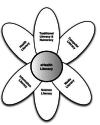Empowering Patients Through Digital Health Literacy and Access to Electronic Medical Records (EMRs) in the Developing World
- PMID: 38707104
- PMCID: PMC11066815
- DOI: 10.7759/cureus.57527
Empowering Patients Through Digital Health Literacy and Access to Electronic Medical Records (EMRs) in the Developing World
Abstract
This editorial discusses the transformative potential of digital health literacy and the critical role of electronic medical records (EMRs) in promoting patient empowerment in the healthcare landscape of developing countries. It examines the impact of digital media in healthcare, noting its ability to both democratize access to information and services and pose risks of misinformation among populations with limited health literacy. The discussion includes an overview of key literacy components critical for effectively navigating the digital healthcare ecosystem. Our article highlights the critical role of EMR in facilitating a patient-centered care (PCC) model, with a special emphasis on making EMR systems accessible and user-friendly for vulnerable groups in developing countries. The core aim of our study is twofold: First, it sheds light on the significant challenges - be they technical, financial, or infrastructural - that obstruct the adoption of sophisticated EMR systems in these areas. Second, it explores the essential aspect of digital health literacy, advocating for its improvement as a vital step toward enabling patients to effectively engage with their medical records. By addressing these key issues, our study seeks to illustrate how enhancing digital health literacy, alongside increasing the accessibility of EMR systems, can empower patients in the developing world to actively participate in their healthcare processes. This dual focus aims to contribute to the broader discourse on improving healthcare outcomes through more inclusive and patient-centered approaches, particularly in settings that are currently underserved by modern healthcare technologies. In conclusion, the editorial advocates for a concerted effort toward creating a more inclusive and empowered healthcare paradigm. It suggests integrating PCC principles, tailoring EMR systems to diverse needs, and enhancing digital health literacy as strategies to harness digital health innovations for better healthcare outcomes and equity. It emphasizes the importance of ongoing investment in education, technology, and policy to fully leverage digital health solutions in the developing world.
Keywords: developing nation; digital health literacy; emr; emr adoption barriers; healthcare transition.
Copyright © 2024, Sham et al.
Conflict of interest statement
The authors have declared that no competing interests exist.
Figures
Similar articles
-
A pioneering EMR-embedded digital health literacy tool reveals healthcare disparities for diverse older adults.J Am Geriatr Soc. 2024 Aug;72 Suppl 3:S97-S104. doi: 10.1111/jgs.18935. Epub 2024 Apr 29. J Am Geriatr Soc. 2024. PMID: 38682826
-
An exploratory study of electronic medical record implementation and recordkeeping culture: the case of hospitals in Indonesia.BMC Health Serv Res. 2025 Feb 14;25(1):249. doi: 10.1186/s12913-025-12399-0. BMC Health Serv Res. 2025. PMID: 39953485 Free PMC article.
-
The future of Cochrane Neonatal.Early Hum Dev. 2020 Nov;150:105191. doi: 10.1016/j.earlhumdev.2020.105191. Epub 2020 Sep 12. Early Hum Dev. 2020. PMID: 33036834
-
Technology adoption of electronic medical records in developing economies: A systematic review on physicians' perspective.Digit Health. 2024 Jan 12;10:20552076231224605. doi: 10.1177/20552076231224605. eCollection 2024 Jan-Dec. Digit Health. 2024. PMID: 38222081 Free PMC article. Review.
-
Copy-Pasting in Patients' Electronic Medical Records (EMRs): Use Judiciously and With Caution.Cureus. 2023 Jun 15;15(6):e40486. doi: 10.7759/cureus.40486. eCollection 2023 Jun. Cureus. 2023. PMID: 37461761 Free PMC article. Review.
Cited by
-
Proximity care pathways and digitalization: opportunities and concerns for medication safety management-Insights from the ProSafe study on community perspectives.Front Public Health. 2025 Feb 20;13:1486814. doi: 10.3389/fpubh.2025.1486814. eCollection 2025. Front Public Health. 2025. PMID: 40051506 Free PMC article.
-
Best practices in telesurgery: framework and recommendations from the society of robotic surgery (SRS) for safe and effective implementation.J Robot Surg. 2025 Jul 11;19(1):370. doi: 10.1007/s11701-025-02523-x. J Robot Surg. 2025. PMID: 40643832 Review.
-
Exploring the Italian Population's attitudes toward health data sharing for healthcare purpose and scientific research: a cross-sectional study.J Public Health (Oxf). 2025 Feb 28;47(1):99-108. doi: 10.1093/pubmed/fdae313. J Public Health (Oxf). 2025. PMID: 39724930 Free PMC article.
-
The national determinants of digital health: Health professionals' electronic health literacy from a cross-sectional perspective in Ethiopia: An umbrella review.Digit Health. 2025 Jul 21;11:20552076251362396. doi: 10.1177/20552076251362396. eCollection 2025 Jan-Dec. Digit Health. 2025. PMID: 40718400 Free PMC article. Review.
References
-
- Person-centered care--ready for prime time. Ekman I, Swedberg K, Taft C, et al. Eur J Cardiovasc Nurs. 2011;10:248–251. - PubMed
Publication types
LinkOut - more resources
Full Text Sources

